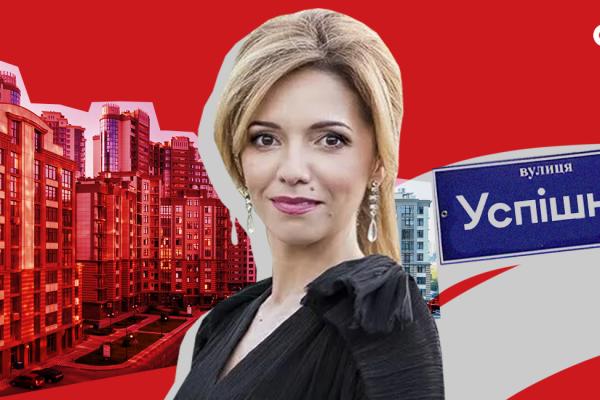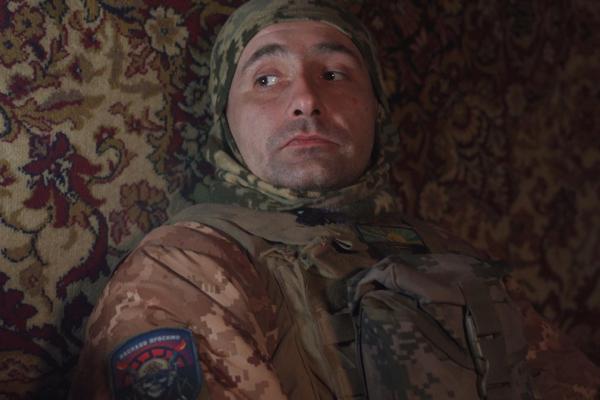The information about Russia’s detention of Ukrainian prisoners in SIZO (Detention Center – transl.) No. 1 in the occupied Crimea appeared in late October. However, there were no witnesses who could describe what was happening directly in the detention center. Slidstvo.info managed to talk to a man who was in this torture chamber arranged by the Russian military.
The Slidstvo.Info journalists recorded a conversation with the Ukrainian soldier Vasyl Buba, who agreed to tell about the conditions of captivity and how he managed to survive and be released. Russians detained the man in the village of Chonhar, Kherson region, because they suspected him of collaborating with the Armed Forces of Ukraine. At first, he was taken to the torture chambers of the region, and then put in SIZO No. 1 in occupied Simferopol.

Vasyl Buba, a former Ukrainian soldier who survived captivity in the occupied Crimea
Vasyl Buba is originally from the village of Chonhar, Kherson oblast. He has been a military man all his life. In Soviet times he served on strategic nuclear submarines and retired in 1989.
When Russian troops invaded Ukraine in 2014, Vasyl went to defend his homeland. For a year (from August 2014 to September 2015), the man served in the 79th Brigade of the Armed Forces of Ukraine. After leaving the service, Buba worked as a chief engineer at the Chonhar entry-exit control point (a Ukrainian checkpoint on the border of the temporarily occupied Crimea – transl.) until Russia launched a full-scale invasion of Ukraine on February 24, 2022.
“THEY REVEALED THAT I WAS AN ARTILLERYMAN”
The first time I was detained was on March 27th in Henichesk as a combatant and activist, plus I cooperated with the “Right Sector”, “Aidar” and others. They kept me in the basement of the school for a day and a half. They also detained my two sons. When they released me, I even tried not to go outside, except to the store and that’s it.
The second time I was detained was on June 17th. They arrested me because there are enough traitors in Chonhar. They revealed that I was an artilleryman. I was a commander of a self-propelled artillery unit in the 79th brigade. My first wife, with whom I had not lived for 8 years, was taken away with me. We were taken to the “basement” in Henichesk, on June 18, FSB officers arrived and began to torture me with electric shocks. Then they took me to Kherson to the temporary detention facility, I stayed there until the 23rd, and in the morning they woke me up and took me away. The only thing I asked was to let my ex-wife go. Somehow I managed to persuade them.
I was kept with Maksym for two nights. He is a captain who worked with radar antennas. In 2021, he retired and continued to work, as far as I remember. Maksym was surrendering orc positions at the Chornobaivka airfield. And then they figured him out and arrested him somewhere in early June. He, of course, held on, although he was beaten with electricity, tortured specifically, mocked. Then they brought his wife with a child, a 15-year-old girl and said: “We don’t need the wife, but we can lay the girl one by one.”
CRIMEA. CELL No. 184
Maksym and I were brought to Simferopol, where we were held in the basement of the FSB for almost two days. They mocked us there. From the basement of the FSB they took us to Simferopol SIZO No. 1 (Lenin Avenue, 4. Cell No. 184). It was on the 25th in the late afternoon, and the reception was tough, very tough. I was interrogated for about 40 minutes.
I spent two weeks in a 6-bed cell alone. Then the Russians brought 28-year-old Volodymyr from Melitopol, he was leaving with his civilian wife to Bulgaria, his sister was to meet them in Crimea. And at Chonhar, their phones were checked. His phone was run through a computer and so the guy got to the Simferopol detention center. His girlfriend is pregnant, due in January. Volodya was really scared.
Then in July, about two weeks later, the third one was brought to us – Oleksandr Novatsky (a policeman who was kidnapped by the Russian military in Kherson – ed.).
“SHOOT ME SO THAT I DON’T SUFFER”
If the Russians did not like something, we were beaten. They would come into the cell and just beat us on the legs, kidneys, back if they heard something wrong, or if there was a morning “shift change” of these “vertukhayas” (prison guards – ed.). They could hit with a shocker.
Everyone was beaten, everyone was. Oleksandr Novatsky often sang the anthem of Ukraine. He sang the song “Chervona Kalyna” well. Maybe the Russians heard it…
There was a period when Novatsky was very ill with a cold. No wonder: the mattress, pillow, everything just got wet to the floor. It was hard to ask for medicine. For example, I had a very heavy internal bleeding. I wanted to ask to be taken to the doctor… Well, they said they could take me then, a couple of floors down and “cure” it.
Thank God, they started giving books. The guys read, at least they were distracted… Ordinary Soviet books. “How Steel Was Tempered”, for example.
Sanya read aloud to us, because my eyesight is bad, so we asked him to read. Once he cried too… He was reading a book and tears were flowing. Because no one knows anything: where you are, what you are.
I’ve already asked these fools myself: “just take me out, shoot me so I don’t suffer… what the fuck do I care where you kill me”. Because there they put moral pressure on people so that there is nowhere else to go.
“I THOUGHT I WAS GONNA GO CRAZY”
I’m just sick of it all. Even when I speak, I hear myself starting to stutter. It’s hard for me to remember all this… When I watch how after the liberation of Kherson they started to show where all the guys were thrown into basements, I just cry.
It’s overwhelming. The psychological state of any person is pressing. When I was alone for two weeks, I thought I would go crazy. Then this guy was brought in, and then Oleksandr and it became a little more cheerful. When there are three of us, we can talk about something.
Similarly, a person breaks down if he is not allowed to communicate with someone close to him, and even more so if his relatives do not know where he is, it is very difficult to bear it all.
There, they try to kill people psychologically, so that they are morally depressed. Because physically people gradually get used to it. But psychologically…
“TRADITIONAL” WEEKLY INTERROGATIONS
At the time of my release there were 51 people in the SIZO.
They were interrogated. Once a week – steadily. If there were young FSB officers, they could press, and the older ones, who were 40–45 years old, were a little calmer. Oleksandr Novatsky was even interrogated by a lieutenant colonel. And we had one, I do not know his name, but he was a captain by rank. He was the curator of all those who were sitting on the third floor.
There was even a girl, I guess Natasha, across the cell from us, just in solitary confinement since March, imagine! Then she was transferred about two weeks before I was released, to a place closer to the warden’s office…
During interrogations they asked such stupid questions. If you don’t answer, you’ll get it. If you do not tell them anything positive, deny, you would also be beaten.
“FOR THEM, HUMAN LIFE IS WORTH NOTHING”
I realized there that human life is worth nothing to them. Exactly nothing. As far as I know, three 200s (the deceased – transl.) were taken out of the isolator in May, and two more in July. I remember all the guys who were there from Kherson, by name, I have not forgotten yet…
Once they arrested one policeman and raped him with a truncheon. Three days later, the guy hanged himself. They were just killing people there.
They brought a woman born in 56 to the detention center, just imagine! I remember it for sure. There were a couple of women’s cells there.
“COOPERATION” WITH THE FSB
I was forced to sign documents. I said that write whatever you want, anything, I will sign everything. So they even indicated my foreign passport. Although I have never received a passport in my life. I started to say that this is not my data. There was a young guy there, Lieutenant of Justice Tishchenko P.O. He was from somewhere in the Krasnodar region. He began to get very irritated: “If you talk too much, you will not be released at all. So sign what you have”. But in principle, I did not care what was written there. So I signed, albeit retroactively, on August 25, and signed on the 26th.
There is all sorts of nonsense in the document. That I want to cooperate with the FSB and everything else. Yes, I am “burning with the desire” to cooperate.
I was also forced to sign documents in March. Each time they approached me when I was on my knees, everything was tightly tied, I had no breathing space, and I stood on my knees for at least 8 hours in a cold basement. Completely tied up, handcuffs “tenderness” so fastened behind that my hands are still going limp. They came up and said: “if you manage to find out something about Azov, Asker, Aidar, Right Sector. If someone appears, be sure to report to us”.
Well, I had to sign. Every 30–40 minutes they came to you and said in your ear: “well, do not forget, old man, that you have five granddaughters in Chonhar, we can bring them to you for a meeting”. That’s the situation. Just crazy people.
“TOO OLD – USELESS”
How did they release me? I understood from the conversation with one of the investigators that I was too old, like “we don’t need you anymore and everything else”.
I was told that I would stay for another week and then be released. I thought that they would take me to Chonhar and then go towards Kherson, but it turned out that they took me to Oleshky (a town in Kherson oblast – ed.). Two people were taken away – me and Eduard. He is also either a retired captain or a major. He retired only in February, he is from Kyiv and came to Kherson just before the beginning of hostilities to solve some family problems with his foster parents. And his “well-wishers” also betrayed him at the beginning. He had been arrested since March. All that was left of him was skin and bones.
We had no phones or documents. I asked where my passport and phone were – no. Get there as you want. We were also lucky that people did not refuse to give us money and Antonivsky bridge was destroyed, only the ferry was running. We successfully reached Kherson by the first boat. It’s good that we made it in the morning, because if we got there in the evening, we would have 100% gone in a new circle (captivity – ed.), because there were arrivals on the bridge and the Russians were making searches. Oleksandr Novatsky and I had an option: if they did not take me to Chonhar, I would go to his apartment in Kherson and stay there until the liberation.
Vasyl Buba was diagnosed with cancer. Now he and his wife live with relatives in Nikopol and are preparing for the sixth chemotherapy. Another surgery is ahead and it is unknown how long his treatment will last.
There is currently no information about Oleksandr Novatsky, who remains in SIZO No. 1. Russia does not confirm the man’s captivity neither to his family nor to the official authorities. The Slidstvo.Info journalists told about his story in a video.
The exact number of Ukrainians abducted by Russians and illegally detained in occupied Crimea or Russia is currently unknown.
The video has English subtitles.



